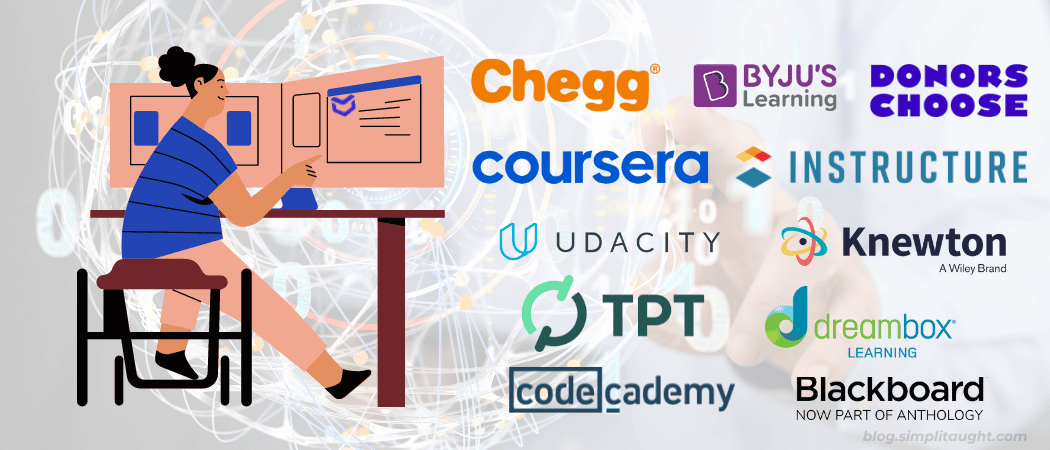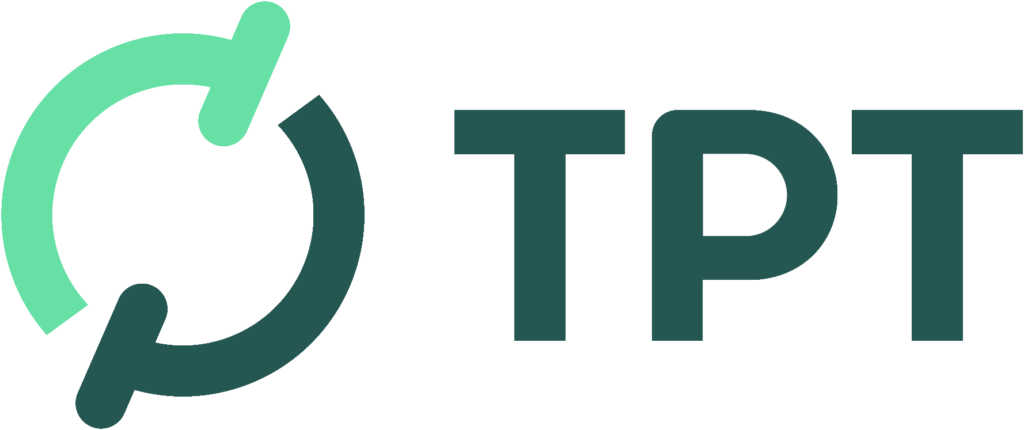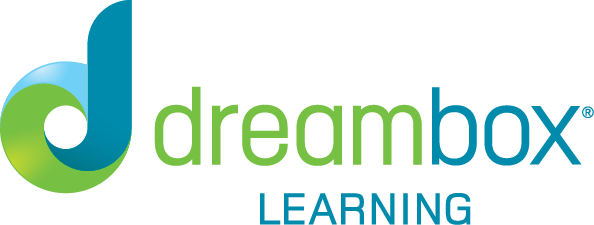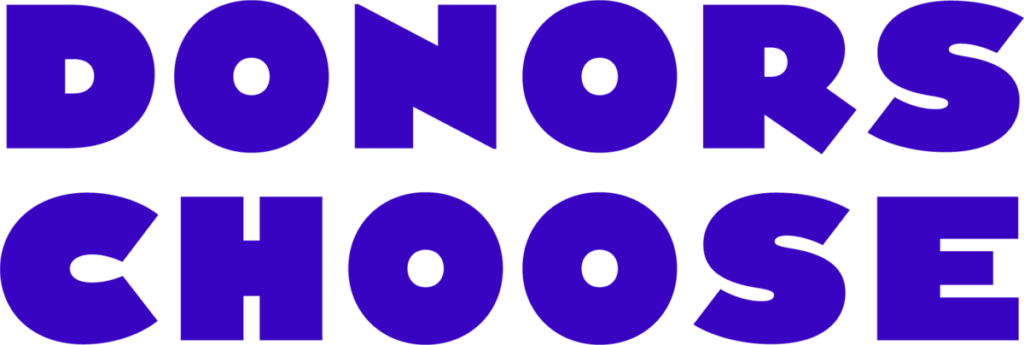Education is an essential part of any society and leads to progression in general. However, Covid-19 has set a new kind of normal, with online learning becoming more prominent. But the question remains: What are the best edtech companies that may make online education easier for those who struggle with this new form of knowledge delivery and acquisition?
While it can be difficult for some learners to learn as much as others, technological evolution is making learning more efficient for students. In addition, the combination of education and technology produces more stunning results, easing the learning process, dissecting learners’ progress, and providing them with feedback accordingly.
Top 12 Best EdTech Companies
Several edtech companies in the market combine innovative technology with educational techniques to give students an exceptional online learning experience while lifting the burden off the shoulders of instructors.
We have compiled a list of 12 of the best edtech companies currently dominating the industry.
Chegg
Chegg, founded in 2005, is an online education platform that offers students a wholesome learning experience. Speaking of statistics, Chegg has more than 7.8 million subscribers, which are likely to grow with the latest advancements by the company.
Chegg works in three key areas of learning. First, they provide learning resources to students. Moreover, students can opt for online tutoring. Chegg is also helping learners with their assignments and self-learning. Additionally, learners can rent, buy, or sell books on the platform.
The platform has also introduced Uversity, which enables educators to share learning content. In addition, Chegg is using student data and AI to provide relevant content to students, from videos, quizzes, flashcards, math, and writing support to a more personalized learning experience based on learners’ needs.
Byju’s
Byju’s entered the realm of education in 2011 when it started as a simple learning platform. But, on the contrary, this edtech startup is now one of the most established names in the industry, still spreading across the globe due to its outstanding services.
The app has over 150 million users, providing online video lessons to learners from grades LKG to 12th via their web and mobile apps. On top of that, these video lessons come with gamified representations of complex concepts, hence keeping students engaged and making education fun.
Besides, it offers study materials for learners to prepare for standard entrance exams in India. What makes Byju’s stand out from the crowd is that they continuously strive to innovate and create an incredible learning experience for their students.
Coursera
Coursera is based in California, USA, and is well renowned for its MOOC platform connecting learners with over 150 universities. In addition, they provide over 4000 courses in various subject areas, helping learners acquire the best knowledge quickly.
Students get on-demand video lectures through their web and mobile applications. Students can also interact, collaborate, and learn via their community forums. Today, Coursera is one of the most prominent ed-tech startups providing e-learning solutions.
Blackboard
Blackboard – a Washington-based company, is one of the giants in the ed-tech industry. The platform assists instructors in offering quality education to learners through its enterprise technology and services for learning, teaching, and student engagement.
The company aims to revolutionize learning and teaching through its pioneering services. It stands at a total valuation of $700 million. The ed-tech app has various services and products serving people in K-12, higher education, businesses, and government agencies.
Likewise, they aid educational institutions to succeed through services like enrolment, marketing, LMS, etc. It also helps K-12 communities to stay connected, teach, and learn. Moreover, governments and businesses are using their solutions to provide skill training.
Teachers Pay Teachers
Teachers Pay Teachers, aka TPT, is created by instructors for instructors to collaborate, interact, and share content and tools for teaching with each other. Today, TPT’s community has around 7 million educators and a catalog of over 5 million teacher-created content pieces to support student learning and teaching.
The company’s goal is to create connectivity among educators. So, teachers can use their platform to buy and sell lesson plans, worksheets, and additional resources from fellow instructors. In addition, TPT is generating an annual revenue of $25 to $50 million as a marketplace for original educational content and resources.
Knewton
Knewton is an educational platform based in New York focused on providing a customized learning experience to students through adaptive technology. It encourages innovative learning by helping students identify their strengths and weaknesses, thus aiding them in areas where they need improvement.
Teachers receive feedback and analytical reports regarding their students’ performance from the platform. Likewise, the platform aims to make e-learning easier by offering personal recommendations to learners based on their preferences, analytics to instructors to support learners, and content insights to publishers to produce better learning products.
Instructure
Instructure combines LMS and MOOC to provide quality education to learners and serve the teaching community. For example, instructors can create new courses and assign homework to students.
The platform has some 3000 universities listed on its site. Additionally, Instructure supports over 30 million teachers and students at more than 6000 institutions worldwide. The app has over 6 million active users.
Udacity
Udacity is also a MOOC platform, well known for its technology courses. It assists professionals in attaining all the necessary tech skills that organizations are looking for in employees.
Their main aim is to make education affordable and accessible for everyone to achieve their career goals, from getting a dream job to advancing in their careers. Moreover, Udacity offers nano-degree courses and programs in robotics, machine learning, artificial intelligence, data science, cloud computing, and autonomous systems.
DreamBox Learning
Based in Seattle, USA, Dreambox Learning makes math learning fun through adaptive technology. The only difference between other ed-tech platforms and Dreambox learning is that while others focus on creating comprehensive understanding, it helps learners learn maths using innovative technology.
Dreambox helps students learn at their own pace, thus making learning and education more accessible and exciting. To achieve this goal, the platform analyzes the students’ knowledge levels and then assigns courses to help them improve their skills. Today, they have 3 million users and $21.4 million in revenue.
Codecademy
Codecademy helps millions of students to upgrade their careers, build meaningful projects, and gain confidence in their abilities with flexible, accessible, and engaging education on data skills and programming.
They provide learners with hands-on interactive lessons on Python, Javascript, and much more. In addition, Codecademy also gives its users access to personalized lesson plans, realistic projects, and quizzes.
DonorsChoose
This non-profit ed-tech company prioritizes practical learning. Through the DonorsChoose platform, learners can get funding from donors for their projects. They help students complete their tasks without worrying about financial limitations by connecting donors with learners.
Hence, they create a learning environment where things happen, and students can apply practical knowledge in real-world situations. As the edtech industry is flourishing, we will see more ed-tech companies coming into existence.
SimpliTaught
SimpliTaught is an AI-powered educational platform that provides students with curated content around key learning concepts. It allows learners to learn from the best educators worldwide. The platform uses artificial intelligence and machine learning algorithms to give a highly personalized experience based on student’s preferences and interests.
Their live chat and video conferencing features allow students to collaborate and interact with fellow learners and educators. Moreover, their smart curation and recommendation engine provide students with the right content at the right time.
Additionally, the platform empowers educators, content creators, and institutions to create content and courses to reach global audiences. Thus, they can promote their lesson plans, videos, audio, courses, or other learning materials using SimpliTaught’s powerful ed-tech platform.
Final Thoughts
When the education field started adapting to the Covid-related changes, it realized that to serve students and educators, the industry needed a revamp. Traditional classroom education had its own drawbacks and left huge gaps when it came to adaptive learning and inclusiveness.
However, incorporating technology into learning has given a greater purpose to education than just learning from textbooks. It has actually helped students recognize their strengths and weaknesses, be proactive in the learning process, and communicate their needs.
Ed-tech companies do not entirely replace traditional learning forms, but they provide solutions that make education fun, engaging, and more comprehensive. Therefore, learners can resort to both conventional and ed-tech-powered learning to acquire knowledge without any hassle.
Moreover, ed-tech reduces the burden off instructors to let them focus on more essential tasks like student engagement and collaboration. Hence, edtech will continue to stay, and more companies will develop different advanced technologies to back up the education industry in the coming years.













